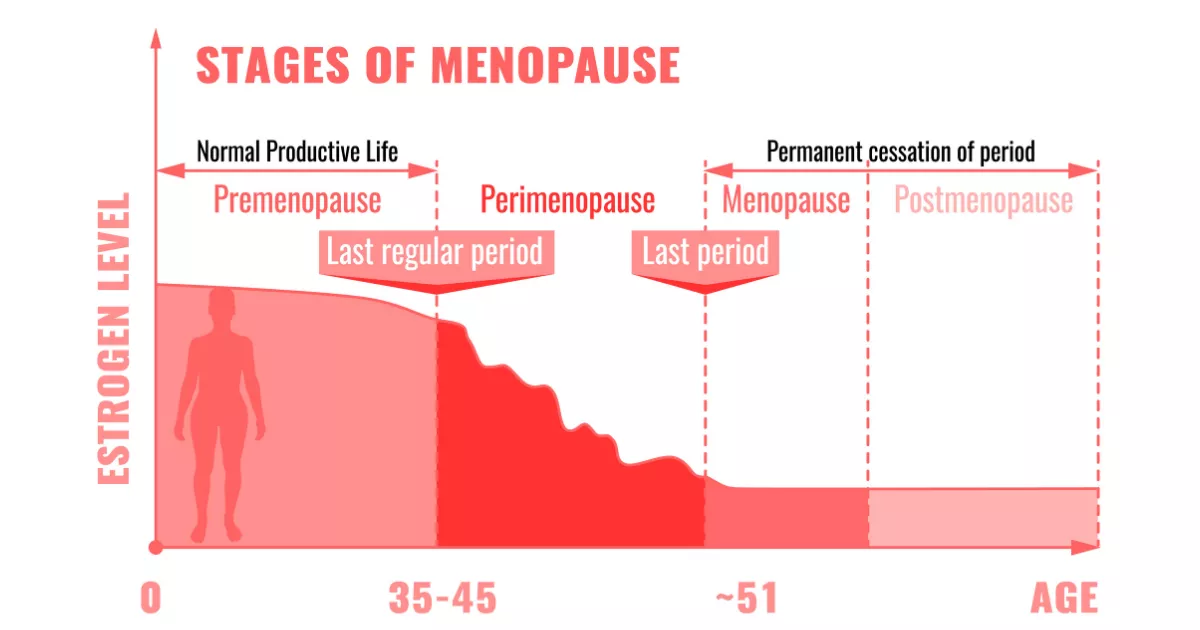Stages and Duration: How Long Does Menopause Last?
Many people believe that menopause occurs for a few months in a woman’s life when she turns 50, and that’s the end of it. The reality is that menopause has many different stages, and its duration is different for every stage and every person going through it.
It’s also true that women can start experiencing menopause symptoms when they’re in their 30s (or 20s for premature menopause) and that the symptoms can come and go for long periods of time until actual menopause is complete.
How Long Does Menopause Last On Average?

Stages of Menopause
(This image is from Shutterstock)
Menopause is the permanent cessation of menstruation. It includes the slowing of estrogen and progesterone production and a variety of associated symptoms. Menopause is diagnosed in women who have gone 12 consecutive months without having their period. It typically occurs in women between the ages of 45-50, but ages may vary. Once this one-year mark passes, women are considered to be postmenopausal.
In the years leading up to their menopausal period, women may still experience bouts of prolonged menstrual cessation, called perimenopause. Perimenopause can begin in some women in their 30s, but most often, it starts in women ages 40 to 44. It is marked by changes in menstrual flow and in the length of the cycle. There may be sudden surges in estrogen.
While each women’s perimenopause length will vary based on age and other factors, the average duration is around four years. During this time, women will experience menopause symptoms but won’t be considered in menopause until they’ve gone a full year without menstruating. Symptoms may include, but are not limited to:
- Hot Flashes
- Chills
- Night Sweats
- Sleep Issues
- Mood Changes
- Emotional Distress
- Loss of Energy
- Heart Palpitation
- Vaginal Dryness
- Urgent and Frequent
If these symptoms interfere with your quality of life, work with your doctor to develop a management plan.
Menopause Duration: How Long Will Symptoms Last?
The duration of menopause symptoms may only be a few months for some women, but for others, symptoms can persist for up to 10 years, continuing with varying degrees of intensity for several years after menstruation has stopped. Postmenopause symptoms may linger for around four to five years with intermittent intensity. It’s important to develop a management plan to minimize the impact of these symptoms on your health and quality of life both independently and with your doctor.
It’s important to realize that while your menopause may last for years throughout all the different stages, there are ways to reduce or mitigate them. Some of the everyday management tips for managing long-term menopause symptoms include:
- For Mood Changes – Relaxation and stress-reduction techniques (deep-breathing exercises, massage, meditation, etc.); proper nutrition and exercise; therapy or counseling; over-the-counter medications (St. John’s wort, vitamin B6, etc.). In more serious cases, antidepressants may help relieve long-term severe depression.
- For Night Sweats – Dress in lighter, more breathable clothing during bedtime; cool down the room with your air conditioner or an electric fan; keep a frozen cold pack under your pillow and turn over the pillow often so that your head is always resting on a cool surface, or put a cold pack on your feet.
- For Trouble Sleeping – Establish a healthy and consistent sleep routine; engage in a relaxing activity like reading or listening to calming music before bed; turn off all electronics and get them out of your bed; keep the room at a comfortable temperature and darkly lit; keep your bedroom just for sleeping and sex.
Work with your doctor for tips on how to effectively manage hot flashes, sexual dysfunction, and other menopause symptoms. You can further empower yourself to manage your menopause transition independently by downloading the Responsum for Menopause app.


